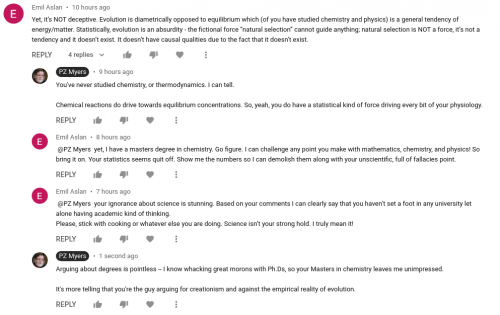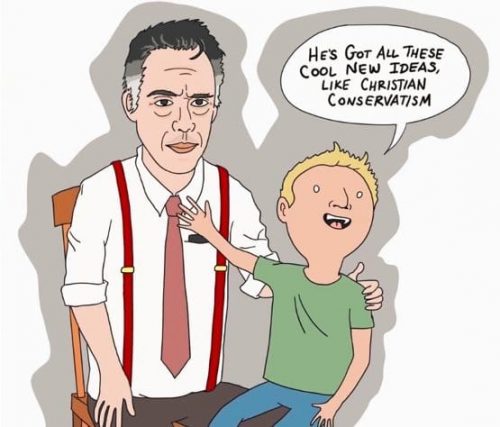Rhawn Joseph is back. Two years ago, I posted a comprehensive list of my engagements with that fraud, so if you want, you can review it there. There’s a lot. It’s all very silly. I even made a video about his claim to have found Marshrooms. Last year, I made a post about his latest publication, in which I wrote, “Let’s hope this is the end of Joseph and Wickramasinghe.” Hah! Right.
Here, in May of 2021, he has again published a Martian mushroom paper titled Fungi on Mars? Evidence of Growth and Behavior From Sequential Images in the journal Advances in Microbiology. It’s 63 pages long! Of course, most of it is photos cribbed from NASA that are blown up and processed to make his imaginary point. To quote some legitimate scientists:
Michael Brown, an astronomer at Monash University in Australia, said “there’s some pretty horrible over-interpretation of blurry photos,” while Gretchen Benedix, a geophysicist at Curtin University in Australia, noted “increasing image sizes to investigate the objects of interest does not change the resolution of the image and therefore does not give better analysis of the objects of interest.”
Rocco Mancinelli, the editor in chief of the International Journal of Astrobiology, called the science and logic “completely flawed,” and said he would recommend it be rejected for publication.
Yet various versions of this garbage hypothesis were and are being published. Here’s the abstract for Rhawn Joseph’s latest:
Fungi thrive in radiation intense environments. Sequential photos document that fungus-like Martian specimens emerge from the soil and increase in size, including those resembling puffballs (Basidiomycota). After obliteration of spherical specimens by the rover wheels, new sphericals-some with stalks-appeared atop the crests of old tracks. Sequences document that thousands of black arctic “araneiforms” grow up to 300 meters in the Spring and disappear by Winter; a pattern repeated each Spring and which may represent massive colonies of black fungi, mould, lichens, algae, methanogens and sulfur reducing species. Black fungi-bacteria-like specimens also appeared atop the rovers. In a series of photographs over three days (Sols) white amorphous specimens within a crevice changed shape and location then disappeared. White protoplasmic-mycelium-like-tendrils with fruiting-body-like appendages form networks upon and above the surface; or increase in mass as documented by sequential photographs. Hundreds of dimpled donut-shaped “mushroom-like” formations approximately 1mm in size are adjacent or attached to these mycelium-like complexes. Additional sequences document that white amorphous masses beneath rock-shelters increase in mass, number, or disappear and that similar white-fungus-like specimens appeared inside an open rover compartment. Comparative statistical analysis of a sample of 9 spherical specimens believed to be fungal “puffballs” photographed on Sol 1145 and 12 specimens that emerged from beneath the soil on Sol 1148 confirmed the nine grew significantly closer together as their diameters expanded and some showed evidence of movement. Cluster analysis and a paired sample ‘t’ test indicates a statistically significant size increase in the average size ratio over all comparisons between and within groups (P = 0.011). Statistical comparisons indicates that arctic “araneiforms” significantly increased in length in parallel following an initial growth spurt. Although similarities in morphology are not proof of life, growth, movement, and changes in shape and location constitute behavior and support the hypothesis there is life on Mars.
I admit, I perked up at the mention of araneiforms — that’s spider-like shapes. It’s not about spiders on Mars, darn it, it’s about these complex dendritic shapes that appear and disappear on the Martian landscape. Joseph wants to claim that that is evidence of fungal life, based on over-interpretation of photos from Mars rovers. It’s not. No one is denying that there are ongoing changes on Mars — seasonal variations, windstorms, erosion, shifting dunes, all that sort of geological stuff. The question is whether it is caused by biology, and so far, the answer is it is not. There are better explanations for the araneiforms, for instance: The formation of araneiforms by carbon dioxide venting and vigorous sublimation dynamics under martian atmospheric pressure.
The local redistribution of granular material by sublimation of the southern seasonal CO2 ice deposit is one of the most active surface shaping processes on Mars today. This unique geomorphic mechanism is hypothesised to be the cause of the dendritic, branching, spider-like araneiform terrain and associated fans and spots—features which are native to Mars and have no Earth analogues. However, there is a paucity of empirical data to test the validity of this hypothesis. Additionally, it is unclear whether some araneiform patterns began as radial and then grew outward, or whether troughs connected at mutual centres over time. Here we present the results of a suite of laboratory experiments undertaken to investigate if the interaction between a sublimating CO2 ice overburden containing central vents and a porous, mobile regolith will mobilise grains from beneath the ice in the form of a plume to generate araneiform patterns. We quantify the branching and area of the dendritic features that form. We provide the first observations of plume activity via CO2 sublimation and consequent erosion to form araneiform features. We show that CO2 sublimation can be a highly efficient agent of sediment transport under present day Martian atmospheric pressure and that morphometry is governed by the Shields parameter.
You’ve got a thin atmosphere where the repeated freezing and sublimation of carbon dioxide is a major factor, and you want to claim that mushrooms are thriving to the point that they spring up overnight in the tracks of Mars rovers? OK, pull the other one, guy.
By the way, Joseph still touts his affiliation as being with cosmology.com, his vanity website where he publishes articles about the Quantum Physics of Time Travel and the consciousness of the universe. That’s the fake journal I trashed, which he then put up for sale for $100,000. If you check it out now, he’s selling it for $50,000. I’m waiting for the price to get down around $1.98, and then I’ll snap it up.
Or…hey, Rhawn, I’ll take the responsibility off your hands right now, no charge, and keep the site up as a historical curiosity, with maybe just a little front-page editorial commentary. You know it’s an embarrassment, just dragging you down, pass it on to someone who’ll keep it alive a little longer.











